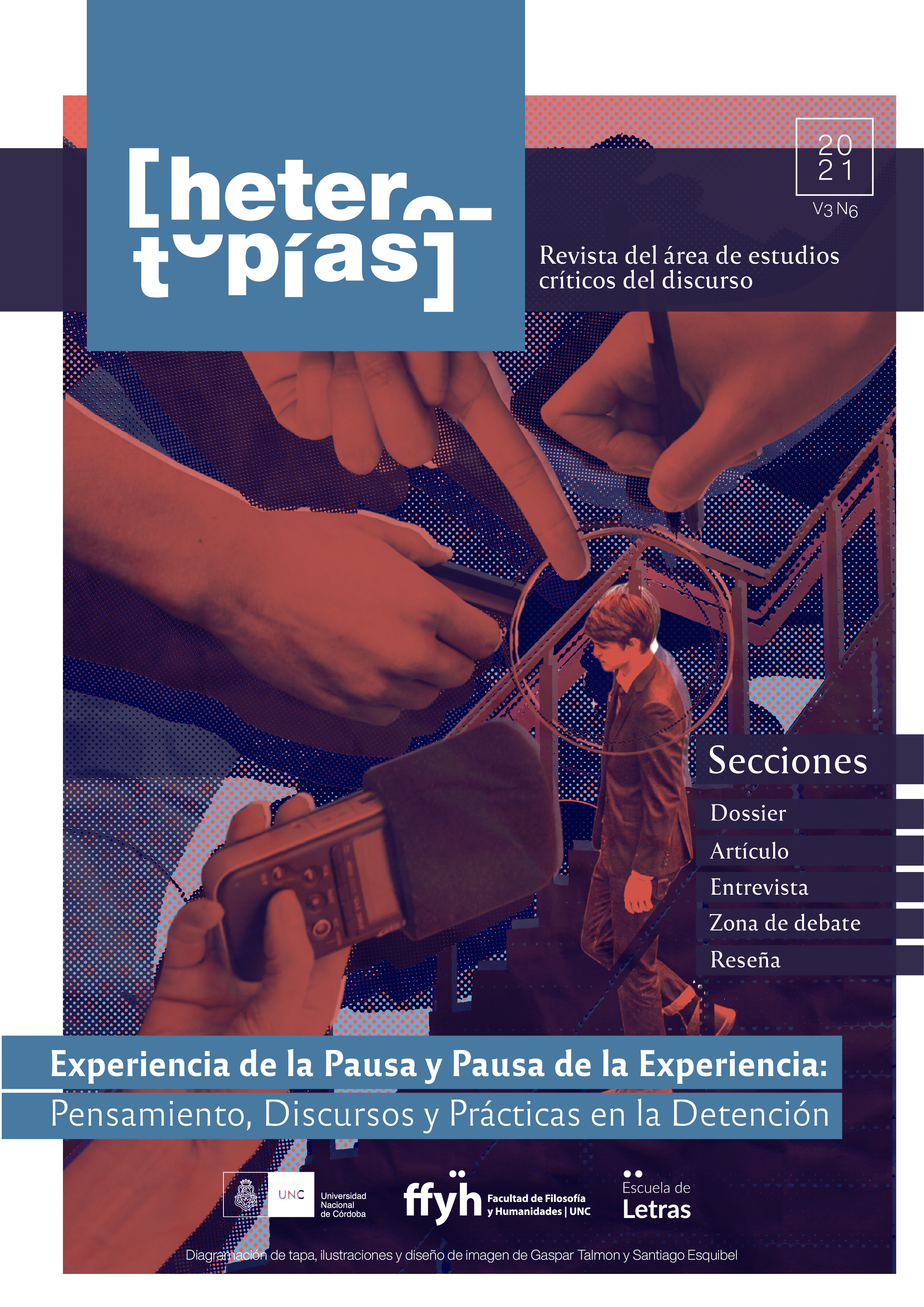Archival Languages: extraction, silence, secrecy
Main Article Content
Abstract
This paper presents some reflections on the archive and its metaphors: the past asa figure of extraction, the secrecy as a limit of discourse, the silencing as an elusive task of history. The relationship between archive and the disciplining of alterity, archive and the administration of populations, are worked upon ideas of connection, loss and story. The text addresses the archive as consignment (ordering), as a place (of enunciation) and as a strategic locus (of the archivist). Nevertheless, this locus is always haunted by the appearance of an out of text which, while giving it existence, threatens the very authority of the archive.
Downloads
Article Details

This work is licensed under a Creative Commons Attribution-NonCommercial-ShareAlike 4.0 International License.
Those authors who have publications with this journal, accept the following terms: Those authors who have publications with this journal, accept the following terms:
a. The authors will keep their copyright and guarantee to the journal the right of first publication of their work, which will be simultaneously subject to the Creative Commons Attribution - Non-Commercial - Share Alike (by-nc-sa) Attribution License; no commercial use of the original work or any derivative works is allowed, the distribution of which must be done with a license equal to the one that regulates the original work.
b. Authors may adopt other non-exclusive license agreements for the distribution of the published version of the work (e.g., deposit it in an institutional telematic archive or publish it in a monographic volume) provided that the initial publication in this journal is indicated.
c. Authors are allowed and recommended to disseminate their work through the Internet (e.g. in institutional telematic archives or on their website) before and during the submission process, which may lead to interesting exchanges and increase the number of citations of the published work. (See The effect of open access).
How to Cite
References
Abrahms, P. (1988[1977]). Notas sobre la dificultad de estudiar el estado.Journal of HistoricalSociology, 1(1), 58-89.
Agamben, G. (2006). El tiempo que resta. Comentario a la Carta de los Romanos. Madrid: Trotta.
Borges, J. L. (2014[1944]). Funes el memorioso. Cuentos Completos (pp. 368-371). Buenos Aires: DeBolsillo.
Carr, E. (1983[1961]). ¿Qué es la historia? Barcelona: Ariel.
Carvalho, B. de (2014). Nueve noches. Buenos Aires: Edhasa.
Das, V. (2004). The signature of the state. The paradox of illegibility. En V. Das y D. Poole (Eds.),Anthropology in the margins of the state(pp. 225-252). Santa Fe: School of American Research Press.
De Certeau, M. (2006 [1975]). La escritura de la historia. México: Universidad Iberoamericana.
Derrida, J. (1997). Mal de archivo. Una impresión freudiana. Madrid: Trotta.
Didi-Huberman, G. (2008).Ante el tiempo. Historia del arte y anacronismo de las imagines. Buenos Aires: Adriana Hidalgo Editora.
Echeverría, B. (2009). La modernidad de lo barroco. México: Era.
Endrek, E. (1966). El mestizaje en Córdoba. Córdoba: Universidad Nacional de Córdoba.
Farge, A. (1991 [1989]). La atracción del archivo. Valencia: Ed. Alfons el Magnánim.
Gilly, A., Subcomandante Marcos y Ginzburg, C. (1995). Discusión sobre la historia. Madrid:Taurus.
Ginzburg, C. (1999). Indicios. Raíces de un paradigma de inferencias indiciales.En Mitos, emblemas, indicios (pp. 138-175). Barcelona:Gedisa.
Gorbach, F. (2016). El historiador, el archivo y la producción de evidencia.En F. Gorbach y M.Rufer (Eds.),(In)disciplinar la investigación. Archivo, trabajo de campo y escritura (pp. 187-202). México: UAM-Siglo XXI Editores.
Harris, V. (2002). A shaft of darkness: Derrida in the archive.En C. Hamilton et al. (Eds.),Refiguring the archive (pp. 63-79). Londres: Kluwer Academic Publishers.
Kafka, F. (1998[1924]). El Castillo. Madrid: EDAF.
Kazba, S. (2004). Our own people. Testimony, mimesis and repression in Cape Town (1976-1990). MA Dissertation in English Studies. Ciudad del Cabo: UWC.
Mignolo, W. (2016[1995]). El lado más oscuro del Renacimiento. Alfabetización, territorialidad y colonización. Popayán: Universidad del Cauca. Trad. CristóbalGnecco.
Nemser, D. (2015). Eviction and the archive: materials for an archaeology of the Archivo General de Indias.Journal of Hispanic Cultural Studies, 16(2), 123-141.
Plotkin, M. (1993). Mañana es San Perón. Propaganda, rituales políticos y educación en elrégimen peronista (1946-1955). Buenos Aires: Ariel.
Rey Rosa, R. (2009). El material humano. Barcelona: Anagrama.
Rufer, M. (2005). Historias negadas. Esclavitud, violencia y relaciones de poder en Córdoba a finales del siglo XVIII. Córdoba: Ferreyra Editores.
Rufer, M. (2016). El archivo. De la metáfora extractiva a la ruptura poscolonial.En F. Gorbach y M.Rufer(Eds.),(In)disciplinar la investigación. Archivo, trabajo de campo y escritura(pp. 160-186). México: UAM-Siglo XXI Editores.
Rufer, M. (2018). La cultura como pacificación y como pérdida. Algunas disputas por la memoria en México. En J. Jaramillo y C. Salamanca(Eds.),Políticas, espacios y prácticas de memoria(pp. 75-110). Bogotá: Pontificia Universidad Javeriana.
Rufer, M. (2020). El perpetuo conjuro: tiempo, colonialidad y repetición en la escritura de la historia. Historia y memoria (número especial), 271-306.
Souza Lima, A. C. (2018[1995]). Un gran cerco de paz. Poder tutelar, indianidad y formación del Estado en Brasil. México: CIESAS.
Stewart, S. (1992). On Longing: Narratives of the Miniature, the Gigantic, the Souvenir, the Collection. Durham: Duke University Press.
Stoler, A. L. (2009). Along the archival grain. Epistemic anxieties and colonial common sense. Princeton: Princeton University Press.
Taussig, M. (1984). History as sorcery.Representations, 7, 87-109.
Taussig, M. (2015[1997]). La magia del estado. México: Siglo XXI.
Taylor, D. (2011). Introducción: performance, teoría y práctica.En D. Taylor y M. Fuentes (Comps.),Estudios avanzados del performance (pp. 7-23). México: FCE.
Trouillot, M. R. (1995). Silencing the past. Power and the production of history. Boston: Bacon Press.
Weber, M. (1977). ¿Qué es la burocracia? Buenos Aires: La Pléyade.
Weld, K. (2014). Paper cadavers. The archives of dictatorship in Guatemala. Durham: Duke University Press.
